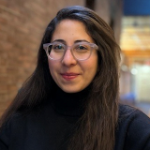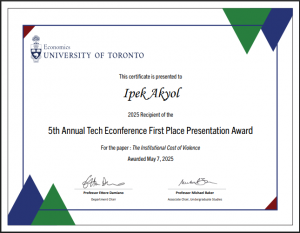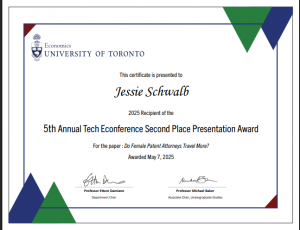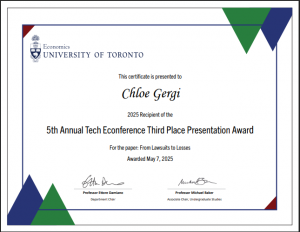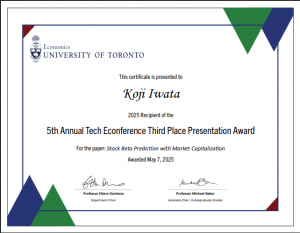The Fifth Annual Tech Econference celebrated the best in undergraduate economics research on May 7, 2025.
The online conference, hosted by the Department of Economics, featured seven presentations of ten minutes in length based on papers submitted during the fall 2024 and winter 2025 terms. Founded by Professor Nazanin Khazra, the conference participants engaged in a series of workshops prior to presenting their work to ensure a smooth delivery of their research results. The presentation papers were selected from the submission pool by Professor Abdollah Farhoodi. Papers submitted included entries from ECO225, ECO403 and ECO418.
Associate Chair of Undergraduate Programs, Professor Michael Baker, New College Principal, Professor of Economics Robert Gazzale, and Professor Courtney Ward acted as the judging panel. Professor Ettore Damiano, Chair of the Department of Economics, was on-hand to make closing remarks and commended the participants for the quality of their work.
Featured Presenters

Chloe Gergi is a third-year student majoring in International Relations and Economics with a focus on data analytics. She presented From Lawsuits to Losses? How Patent Litigation Drives Stock Price Volatility Across Firm Sizes. Her paper investigates how stock prices respond to patent litigation events across firms of different sizes.
“ECO225 was the first course that truly challenged me to think like a researcher,” she said. “Through my project, I realized how powerful data can be in uncovering patterns that aren’t always obvious—like how firm size and patent litigation shape investor reactions to uncertainty. Writing this paper taught me not just technical skills like event studies and regression analysis, but also how to frame questions that connect law, economics, and investor behavior. It deepened my interest in using data-driven research to understand real-world risks, and it has motivated me to pursue opportunities that combine economics, law, and technology moving forward.”

Filip Zaleski is soon to graduate with a double major in Economics with a focus on data analytics and Political Science. Zaleski presented his paper Give People Housing and They Will Have Kids: House Prices and Fertility across U.S. Counties, 2000–2023. In the paper, Zaleski investigates the relationship between housing prices and fertility rates across U.S. counties from 2000 to 2023.
“As one of the most practical courses in my degree, ECO225 taught me much about handling, visualizing, and empirically analyzing data,” he said. “I learned how to compile diverse datasets from scratch, how to obtain data through nonstandard methods like web scraping, and how to work with Python to attach meaning to my data. I also learned how to implement machine learning approaches with Python, complementing my proficiency with linear regression. While, individually, all these skills enrich my competency with data analysis, it is the comprehensive process of working on my research paper that showed me how to answer a research question from scratch. I now feel much more ready to tackle real-world data challenges that will require my creativity and problem-solving.”
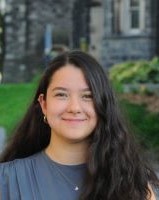
Ipek Akyol is a 4th year undergraduate completing a double major in Economics with a focus on data analytics and Computer Science with a focus on human-computer interaction. She presented The Institutional Cost of Violence: Political Trust under Pressure in Nigeria. Akyol’s study examines how increases in political violence affect political trust in Nigeria. Akyol’s co-authors are Cagla Naz Akgul and Vedant Malligaarjunan Iyer.
“I am grateful to have discovered applied econometrics through ECO324 and ECO375, which introduced me to causal inference methods and their application to uncovering relationships underlying economic and social phenomena,” she said. “ECO403 built on that foundation by allowing me to apply these techniques in the context of development economics. As an international student, it was especially meaningful to study how political violence affects trust in institutions, an issue closely connected to my lived experience. Working on this paper strengthened my aspiration to pursue data-driven development research that informs policy in fragile contexts.”

Jessie Schwalb is a fourth-year Woodsworth College student double-majoring in Peace, Conflict, and Justice Studies and Economics with a focus in data analytics. She presented Do Female Patent Attorneys Travel More? Evidence from 1999-2015 US Cases. Using 1999–2015 patent litigation data compiled by the Office of the Chief Economist of the US Patent and Trademark Office, Schwalb found that, even after controlling for case size, year, and the part for which they argued, women patent attorneys were significantly less likely to litigate cases outside the district where their offices were located.
“I entered ECO225 interested in applying quantitative research to public policy but with little coding experience or knowledge to accomplish that goal,” she said. “This course pushed me far beyond what I believed I could accomplish in a semester. Professor Khazra helped me gain the tools I needed to answer the questions that most interest me and, most importantly, instilled a focus on learning for oneself and appreciating research as a creative process. I’m excited to bring these tools and mindsets with me as I start my career analyzing public policy for a non-profit in Michigan, my home state. I’d like to thank Professor Khazra, the ECO225 teaching assistants, and my classmates for their feedback and encouragement, along with Professor Laura García-Montoya, who helped me develop my independent research skills throughout PCJ461.”

Koji Iwata is a second-year student pursuing a BSc with a double major in Mathematics and Economics and a minor in Applied Data Science. He presented his paper Stock Beta Prediction with Market Capitalization: Analyzing Cross-Sector Risk Patterns Through Firm-Level Financials. The paper examines how market capitalization predicts stock Beta across industry sectors, using firm level financial data from 3,700 publicly traded U.S. companies.
“I have always been passionate about applied research in financial engineering, which led me to analyze systematic risk and build predictive models to estimate Beta in U.S. equities for my research paper,” he explained. “ECO225 gave me the flexibility to access and use data from the university’s finance lab and Professor Khazra’s hands-on teaching method allowed me to rapidly apply machine learning, statistical modeling and spatial analysis to my work. Looking ahead, I aim to apply my strong quantitative critical thinking skills to further advance applied research in the finance industry.”

Leran Xu is a third-year New College student double majoring in Psychology and Economics with a focus on data analysis. She presented Assessing the Impact of COVID-19 on Anti-Asian Hate Crimes in the United States. In the paper Xu addresses a central economic question: Did the COVID-19 pandemic cause an increase in anti-Asian hate crimes in the United States, and how did economic and demographic conditions shape that impact?
“ECO225 is a very rewarding course,” she said. “I learned a lot about data analysis techniques and AI-related skills from this course and most importantly, how to start your own research from 0 to eventually authoring a paper. Throughout these experiences, I learned the beauty of data analysis and was delighted whenever my research yielded results. This has inspired me to go deeper in this area in the future, hoping to use data analysis as well as statistical methods to help solve more social problems.”

Zhaoyi Wang is a fourth-year student in the Economics Specialist program with a focus on data analytics. Her research interests include industrial organization and working with geospatial data as an integral part of research. The paper she presented, Closer, Cheaper, Better? Drivers of Electric Vehicle Charging Station Preferences, was co-authored with Yuwei Cai. The paper is an examination of the factors influencing consumer preferences for different EV charging station brands in an urban area of China.
“Collaborating with Yuwei made the research process rewarding and enriching,” she said. “Through ECO418, and with the support of Professor Yao Luo, I learned to construct several empirical IO models, including logit models, and had the opportunity to explore fascinating IO literature and apply it to a topic I care deeply about. This experience helped me clarify my academic interests and gave me an answer to the question of why I am studying economics. Moving forward, I’m excited to keep exploring new questions and finding answers through applied research.”
The Results
Koji Iwata and Chloe Gergi tied for third place while Jessie Schwalb was the second place presenter. Ipek Akyol was named the first place winner.
Return to the Department of Economics website.
Scroll more news.
Support students like these presenters.





